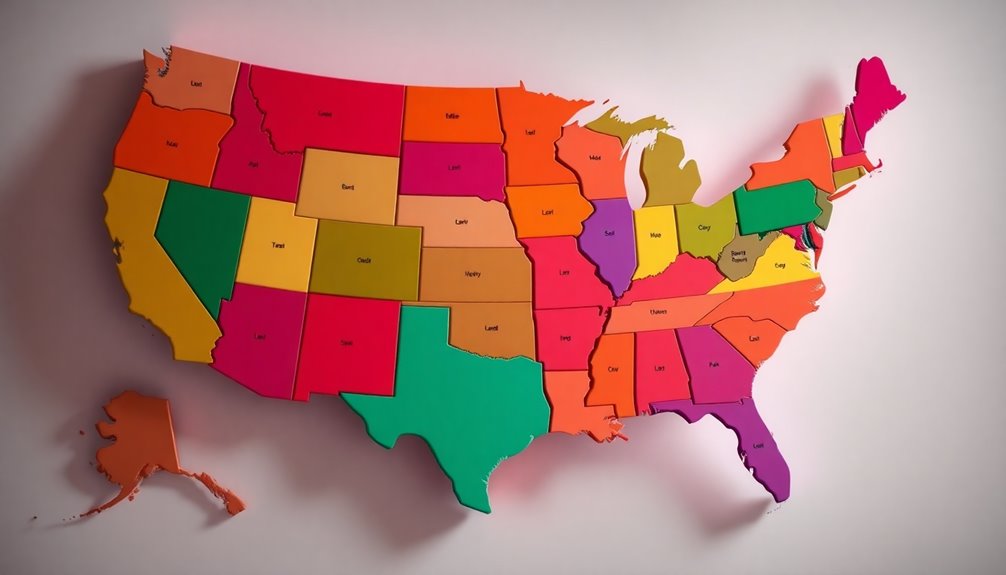If you're looking for lenient states for sex offenders, places like Alaska and Kansas stand out. These states have minimal residency restrictions, allowing you to choose where to live without heavy limitations. Other states, such as Minnesota, Nevada, and Maryland, also offer flexibility by imposing restrictions only on serious offenders or evaluating each case individually. California and Oregon are more forgiving as well, with specific restrictions only applying to higher-risk offenders. Understanding these varying laws can help you navigate the potential for rehabilitation and reintegration. Stick around to discover more about specific state requirements and resources available to you.
Key Takeaways
- States like Alaska, Kansas, and Maryland have eliminated residency restrictions, allowing sex offenders to choose their residence freely.
- California and Minnesota impose residency restrictions only on serious offenders, offering leniency for others.
- Nevada's restrictions are limited to specific offenses against children under 14, providing a more lenient approach.
- Michigan, New Hampshire, New Jersey, and New Mexico allow unrestricted living arrangements for sex offenders.
- Arkansas and Iowa impose few state-level restrictions, leaving local communities to dictate rules.
Overview of Lenient States

When considering the landscape of sex offender laws, you'll find that some states adopt more lenient approaches than others.
For instance, California only imposes residency restrictions on serious and high-risk offenders on parole. In Minnesota, restrictions are applied case-by-case and only during supervision.
Nevada limits restrictions to specific offenses against children under 14 or tier 3 sex offenses. New York also evaluates restrictions on a case-by-case basis.
Texas has residency restrictions that only last during the supervision period. Similarly, states like Oregon and Pennsylvania impose restrictions selectively, focusing on dangerous offenders or during parole.
This flexibility in regulations allows for a more tailored approach, reflecting a growing trend towards rehabilitation and reintegration of offenders into society. States without residency restrictions provide opportunities for community integration and support, enhancing the chances of successful reintegration.
States With No Residency Restrictions

Some states have taken a notable step further by eliminating residency restrictions for sex offenders altogether. In places like Alaska, Kansas, Maryland, and Massachusetts, you won't face specific residency barriers. These states allow you to choose your residence freely, without zoning laws limiting your options. Michigan, New Hampshire, New Jersey, and New Mexico also provide flexibility, letting you reside in any community without additional regulations. Utah and Vermont follow suit, boasting lenient laws that enable unrestricted living arrangements. This approach fosters a more adaptable environment, allowing sex offenders to reintegrate into society without the burden of residency limitations, making these states some of the most lenient in the nation. Furthermore, these states exemplify states with no residency restrictions, thereby promoting a more inclusive atmosphere for those seeking to rebuild their lives.
States With Minimal Residency Requirements

While many states impose strict residency restrictions on sex offenders, several have adopted a more lenient approach, allowing for minimal requirements.
For instance, in Arkansas and Iowa, no state-level restrictions exist unless the offender has a serious conviction involving a minor. Local communities in these states can impose their own rules, offering some flexibility. Additionally, states that have no state-level restrictions often have a more supportive environment for offenders seeking to rebuild their lives.
Similarly, North Dakota doesn't have statewide restrictions for most offenders, leaving it to local authorities to decide.
In Oregon, only sexually violent or predatory offenders face residency rules.
In Texas, restrictions apply only during parole or probation, and once completed, offenders can choose their residence freely.
This leniency enables many to reintegrate more easily into society.
States With Fewer Registration Requirements

Many states not only have minimal residency requirements but also adopt fewer registration requirements for sex offenders.
For instance, Kansas allows offenders to petition for removal from the registry after 10 or 25 years, depending on their offense. Similarly, Ohio features a tiered system where some can seek removal after just 10 or 20 years.
In terms of information required, some states need only basic details, like name and address, and may not mandate DNA or fingerprints for all offenses. Additionally, many states prioritize registration duration based on the severity of the offense, which can affect the overall compliance burden on offenders.
You'll also find that states like Arkansas don't always require registration for HIV-specific crimes.
Notably, many states are lenient with juvenile offenders, allowing age-related exceptions that reduce registration burdens.
States With Registration Exceptions

What makes certain states more lenient when it comes to sex offender registration? Some states offer registration exceptions based on the date of the offense.
For example, in South Dakota, if your offense occurred before July 1, 1997, you won't need to register. Alabama and Wyoming have similar provisions for offenses committed before 1976 and 1989, respectively. Additionally, several states, like Arkansas and Connecticut, make exceptions based on age differences between the perpetrator and victim. Missouri has specific rules where youth registration applies only for certain convictions. New Jersey even provides exceptions for juvenile offenders and cases involving household members. These unique policies can significantly reduce the burdens associated with registration in these states. It's important to note that registration laws vary significantly by state, making it crucial for offenders to understand their local regulations.
Relief From Registration Obligations

When it comes to relief from registration obligations, several states provide pathways for offenders to seek removal from sex offender registries.
You'll find that 18 states allow Tier 1 offenders to petition for removal after a specified number of years, which can vary from state to state. For instance, in some states, you might be eligible after 15 years of registration.
You can petition once you're released from prison or establish residency. Additionally, federal law allows for the reduction of registration periods for Tier I offenders with a clean record for a decade.
Some states even employ risk-based systems that may permit reclassification and eventual removal based on your risk level.
However, always check specific state requirements before proceeding.
Employment and Travel Considerations

Navigating employment and travel as a registered sex offender can be complex, especially since laws and restrictions vary significantly by state. Many jobs involving minors, like those in schools or childcare, are off-limits. You might also find yourself barred from certain industries, such as government agencies or financial institutions. If you're under supervision, your Parole or Probation Officer may need to approve your job location. In addition, registered offenders must adhere to specific requirements and restrictions that can influence their employment opportunities. When it comes to travel, each state has its own rules. Some require you to register after just a few days, while others are more lenient. If you're planning international travel, remember to notify registry officials at least 21 days in advance, providing all necessary details about your trip.
State-by-State Comparison

Understanding the registration requirements and relief processes for sex offenders varies widely across the United States.
For instance, Massachusetts stands out with the lowest population-adjusted rate of sex offenders and has specific relief procedures based on offense tiers.
Maryland allows Tier I offenders to petition for modification after just 2 years, while Tiers II and III can after 5 years.
California uses a 3-tier system with minimum registration periods of 10 years, 20 years, or life, but offers the chance for petitioning relief.
Arizona also incorporates risk assessment methodologies in its relief processes. Additionally, the overall number of registered sex offenders in the U.S. has reached over 795,000, reflecting a growing challenge for states to manage their registries effectively.
Each state has its unique approach, reflecting the diverse legal landscape governing sex offender registration and relief across the country.
Impact of Registration Laws

Although registration laws aim to enhance public safety, they often have unintended consequences that significantly impact the lives of registered sex offenders.
You may find that these laws severely limit your job opportunities, especially in roles involving children or vulnerable populations. Employers can easily access public registries during background checks, leading to heightened scrutiny of your past. Additionally, many industries, such as education and healthcare, may disqualify applicants with sex offense convictions.
Furthermore, residential restrictions often confine you to living far from schools, which reduces your housing options and can even lead to homelessness.
The stigma attached to your status can complicate family dynamics, affecting custody arrangements and visitation rights.
Ultimately, while these laws are intended to protect the public, they can create ongoing challenges that hinder your ability to reintegrate into society.
Resources for Sex Offenders

What resources are available to support sex offenders as they work toward reintegration into society? Several treatment programs can help you on this journey.
The Bureau of Prisons offers residential programs lasting 12-18 months and non-residential programs for 9-12 months, tailored to your risk level. Participation is voluntary, and your background will be evaluated for eligibility.
Counseling, both group and individual, forms a core part of these programs, focusing on alternative thinking and behavior management.
Re-entry planning services assist in transitioning back to the community, offering job placement and housing assistance. Mentoring and family reunification services provide additional support, fostering pro-social relationships and healing family dynamics.
These resources aim to reduce recidivism and promote successful reintegration.
Frequently Asked Questions
How Do I Find a Lawyer Specializing in Sex Offender Laws?
To find a lawyer specializing in sex offender laws, start by seeking attorneys with experience in both prosecuting and defending such cases.
Check their track record and certifications, ensuring they understand your state's specific laws.
Look for firms focused solely on sex crimes defense and those familiar with the local court system.
Investigate their ability to conduct thorough case investigations and provide comprehensive support throughout the legal process.
Don't forget to read client reviews!
What Support Groups Are Available for Sex Offenders?
If you're seeking support groups for sex offenders, several options are available.
You might start with Women Against Registry (W.A.R.) for advocacy and support.
DailyStrength.org offers online groups where you can connect with others in similar situations.
Additionally, organizations like NARSOL and SOSEN provide resources and community support.
Consider exploring local affiliations through NARSOL or online forums for ongoing engagement and shared experiences.
You're not alone in this journey; support is out there.
Can Sex Offenders Vote in Lenient States?
Yes, in many lenient states, sex offenders can vote. For instance, states like Maine and Vermont allow individuals to retain their voting rights even while incarcerated.
Other states automatically restore voting rights upon release, including those on parole or probation.
However, some states impose specific restrictions, so it's crucial to check local laws.
Are There Housing Options Specifically for Sex Offenders?
Yes, there are housing options specifically for sex offenders. You can find transitional housing programs like Hope Homes and My Father's House that cater to your needs.
Many of these facilities offer furnished accommodations in supportive environments. However, you might face challenges like restrictive policies and social stigma.
It's essential to explore comprehensive programs and community support systems that can help you secure stable housing while addressing any concerns you may encounter.
What Are the Penalties for Failing to Register?
If you fail to register, the penalties can vary significantly based on your original offense.
If it was a misdemeanor, you might face up to 364 days in county jail.
However, if it was a felony, you could end up with a state prison sentence ranging from 16 months to three years.
Repeat offenses lead to harsher consequences, including higher felony charges and fines up to $10,000, so timely registration is crucial.
Conclusion
In conclusion, understanding the leniency of different states for sex offenders can provide valuable insight into navigating the legal landscape. By knowing which states have minimal residency and registration requirements, you can make informed decisions about where to live and work. It's essential to stay updated on local laws and resources that can help you. Remember, each state has its own rules, so always do your research to ensure you're fully aware of your rights and obligations.










